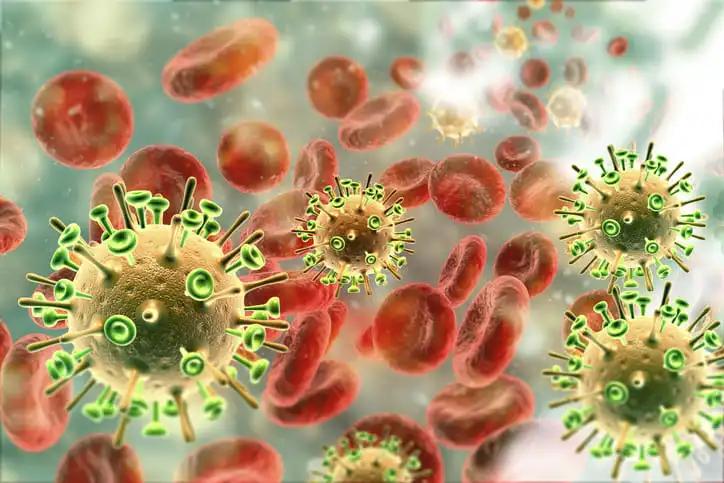KEY TAKEAWAYS
- The Phase 3 study reported clinical outcomes of patients with SR GI-aGvHD treated with the pooled allogeneic microbiotherapy MaaT013 in the EAP in France.
- EAP findings indicated that MaaT013 is safe and effective for treating SR-GI-aGvHD, particularly in those previously on Ruxolitinib.
Acute graft-versus-host disease (aGvHD) is a leading cause of death after allogeneic hematopoietic cell transplantation (alloHCT). While corticosteroids serve as the first-line treatment for aGVHD, over half of the patients (pts) do not respond and are classified as steroid refractory (SR). Ruxolitinib, which has a 60% response rate, is the newly approved second-line treatment for SR-aGvHD. Yet, patients (pts) with severe gastrointestinal (GI) symptoms of aGvHD often find Ruxolitinib ineffective, resulting in poor outcomes. Fecal microbiotherapy, specifically MaaT013, has demonstrated encouraging results for these pts, as shown in an Early Access Program (EAP) in France.
Eighty-one pts with steroid-refractory GI-aGvHD were administered MaaT013. They had previously been unresponsive to between 1 and 6 different systemic GvHD treatments, with a median of 2 treatments (66 out of 81 had taken Ruxolitinib). Among these pts, 51% were diagnosed with grade III aGVHD, and 38% with grade IV. All pts received three doses of MaaT013 at weekly intervals, plus or minus 2 days. Each dose contained 30 grams of pooled full-ecosystem fecal microbiota, administered as a 150 mL inoculum from 4-8 healthy donors via enemas, with one patient receiving it through a nasogastric route. Treatment efficacy was assessed on day 28.
The gastrointestinal overall response rate (GI-ORR) at day 28 (D28) stood at 56%, broken down as follows: 30 pts experienced a complete response (CR), 11 had a very good partial response (VGPR), and 4 showed a partial response (PR). Notably, the effectiveness of the treatment varied with the initial grade of aGvHD, yielding an 89% response rate for grade II, 66% for grade III, and 32% for grade IV.
Considering all 78 evaluated pts, the overall response rate was 49% (24 CR, 11 VGPR, 3 PR), inversely related to the initial aGvHD grade. The six-month overall survival (OS) rate was 51%, dropping to 39% at the 12-month mark. Among responders (R, n=45), the survival rate was significantly higher than non-responders (NR, n=35), showing 69% versus 28% at six months and 59% versus 14% at 12 months. Intriguingly, a better aGvHD response was seen in a subgroup of 31 pts treated sequentially with Ruxolitinib as a second-line and MaaT013 as a third-line therapy, showing a 65% D28 GI-ORR.
MaaT013 exhibited a favorable safety profile, with 20 safety-related incidents reported in 18 pts participating in the EAP. These included 11 cases of sepsis, 2 of C. difficile colitis, 1 of E. coli osteoarthritis, 1 of G. silvicola in stools, 1 of P. aeruginosa sinusitis, 1 of appearance of air bubbles in the mesorectum, and 1 of respiratory distress. Importantly, there was no pathogen transmission documented.
In two instances, non-pathogenic bacteria from the administered MaaT013 batch were isolated following infectious events, though a direct causal relationship could not be conclusively established. The rate of bacteremia was 14%, which compares favorably with the 31-74% typically seen in GI-aGvHD pts.
A total of 47 deaths occurred, with varying underlying causes, including 21 from GvHD, 13 from severe infections, and others from various causes like relapse of malignancy and COVID-19. No causality link with MaaT013 has been established.
The Early Access Program (EAP) data indicated that MaaT013 is a safe and efficacious treatment option for steroid-refractory gastrointestinal aGvHD, particularly for those previously treated with Ruxolitinib. A positive correlation was observed between the gastrointestinal response to aGvHD and overall survival rates, pointing to a favorable benefit-risk ratio for MaaT013. A Phase 3 clinical trial on pts refractory to Ruxolitinib is underway.
Source: https://ebmt2023.abstractserver.com/program/#/details/presentations/1670
Clinical Trial: https://classic.clinicaltrials.gov/ct2/show/NCT04769895
Malard, F., Loschi, M., Cluzeau, T., Legrand, F., Mear, J-B., Lhomme, F., Guenounou, S., Huynh, A., Borel, C., Desmier, D., Moya, N., Charbonnier, A., Lebon, D., Labussière-Wallet, H., Orvain, C., Chantepie, S., Bulabois, C-E., Camus, V., Couturier, M-A., Cornillon, J., Chevallier, P., Mediavilla, C., Ceballos, P., Beauvais, D., Bruelle, M., Plantamura, E., Mohty, M. OS05-08 POOLED FECAL ALLOGENIC MICROBIOTHERAPY FOR REFRACTORY GASTROINTESTINAL ACUTE GRAFT-VERSUS-HOST DISEASE: RESULTS FROM THE EARLY ACCESS PROGRAM IN FRANCE.



